On Saturday American musician William Adams, better known as Will.i.am, the frontman for the Black Eyed Peas, was on a flight from Brisbane to Sydney. The plane was waiting to take off, William who was wearing noise cancelling headphones had missed the instruction to put electronic devices away. He and others were approached by a flight attendant and told to put away devices away. He did so, but noted on Twitter the “overly aggressive flight attendant” which amounted to poor service from the airline. He continued, “I don’t want to believe she racist. But she has clearly aimed all her frustrations only at the people of colour.”
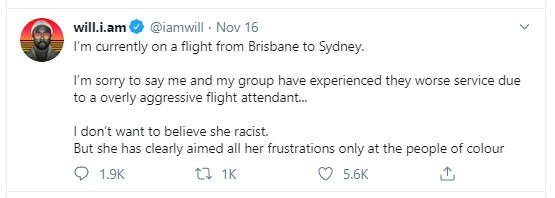
The flight attendant escalated the matter to the Australian Federal Police and five police officers met William when he sought to leave the plane. William has stated that he complied “quickly and politely” when addressed by the flight attendant. Other passengers supported William telling police it was the flight attendant who was out of control. Police eventually let him go.
After dealing with the Police, William tweeted again, this time naming the airline and the flight attendant who he directly called racist. This was a significant escalation from his Tweet prior to the police becoming involved. In the earlier tweet he had avoided naming either the airline or the flight attendant and had described what appears to be racist behaviour while saying “I don’t want to believe she[‘s] racist”. There is a gap between calling behaviour racist, which could result from unconscious bias, ignorance, or a mistake, and calling a person racist which suggests the behaviour was fully intended and targeted at someone because of their ethnicity, nationality or skin colour.
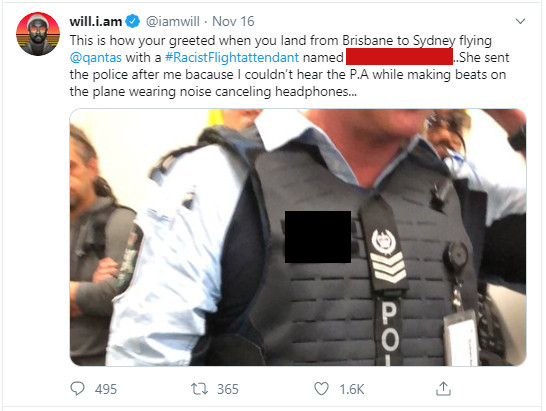
Music duo The Veronicas, Lisa and Jess Origliasso, also experienced problems on the same flight route in late September but heading in the other direction. They have now revealed their incident in fact involved the same flight attendant. Following this tweet, their Twitter account appears to have been taken down.
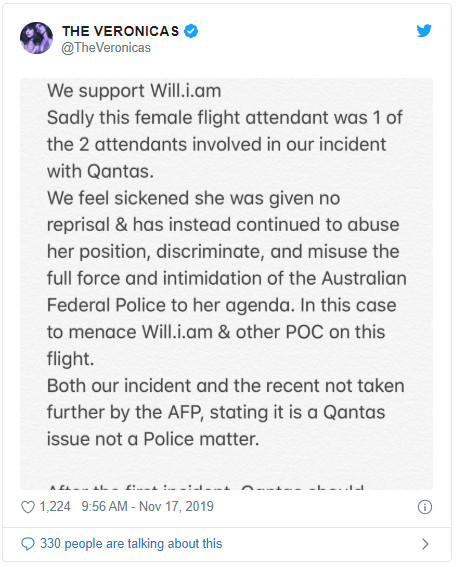
The Origliasso sisters had placed a suitcase the wrong way around in the overhead compartment. After a flight attendant pointed this out, they asked the flight attendant if she could help fix it and the flight attendant refused saying it was against company policy. Another passenger rearranged the bag for them. That should have ended the incident except the flight attendant then came back with a supervisor who lectured the pair. They asked for the name of the flight attendant and supervisor and the crew allegedly refused to provide it and said they would be calling security. The Veronicas started filming and were escorted off the place by police. A passenger seated behind the pair Tweeted that there were no raised voices and there had been no need for the escalation by the airlines.
Airline staff have a significant amount of power, backed by law, when managing their aircraft. That power, however, can be abused. The allegation being made by William, and supported by other passengers on his flight, as well as The Veronicas on another flights, is that a particular flight attendant has repeatedly abused their authority. There is the allegation the abuse is racist in nature and only some people, due to their race, are targeted. The allegations suggest the airline has been on notice about this and has failed to put a stop to it. These accusations need to be investigated and the situation resolved. It reflects poorly on the airline and on Australia.
On naming and shaming
There is a side conversation occurring over William’s naming of the flight attendant. Many see this as a positive use of celebrity to highlight a wrong which might otherwise continue without being addressed. Indeed, the latest allegations have occurred despite The Veronicas raising concerns some months ago. Others on the flight have also made statements on Twitter about the way they were treated. A few people have criticised William for naming the flight attendant in a tweet he made after the matter has escalated to involve the Australian Federal Police.
An entertainment journalist said on Twitter that William should just “go through the normal complaints process” and that he was subjecting the flight attendant to “intimidation and abuse” by naming her in his tweet. A follow up tweet from the journalist told William to “grow up” and criticised him for using his “star power” to draw attention to the complaint. The journalist later deleted these tweets.
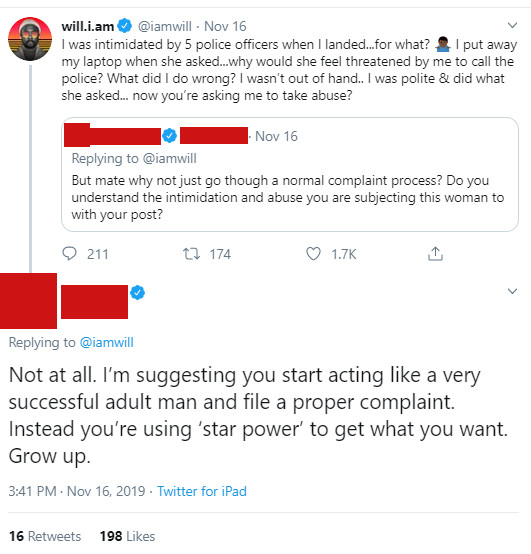
At the Online Hate Prevention Institute, we usually don’t name individuals who have engaged in racism. We also redact names and profile pictures from almost all of the material we share in public. We do this out of concern that a backlash against something racist and the person who said it can at times be more harmful than the initial racism. We recognise that other organisations tackling racism take a different approach and we respect that. Naming and shaming racists creates a social cost to racism that acts as a deterrent. In our view it isn’t the place of anyone else to criticise a victim of racism for naming the person who has caused them harm.
In this particular case we are less concerned about the naming of the flight attendant as it was their name and not a link to social media which was used, nor did it call on anyone to harass her. While William has 12.8 million followers, without a link directly to account most won’t bother focusing on the flight attendant and will instead focus on the airline.
Even without an online response, there is still an offline impact on the named flight attendant. That risk is that passengers might recognise her in the future. The risk is somewhat reduced by airline name tags only provide a first name. If she is recognised, it is likely to be while on a plane. In that situation a flight attendant has a significant amount of power and any abuse would see a passenger escorted off the plane by police.
There were online vigilantes who tried to identify her social media and harass her, but William quickly spoke out against this. He also erased the details of both the poster and the twitter account presumed to be the flight attendants account when he made this post. We commend him both for speaking out and for taking the action of removing the account names in the image he used.

Despite the risk of abuse online, or consequences offline, for the flight attendant, there are a range of arguments in favour of publishing her name. Firstly, there are the allegations of a pattern of abuse. Allowing anyone else who has been unlawfully discriminated against by the same person to step forward is in the public interest. Secondly, while the public might not recognise her, having people who know her become aware of this alleged behaviour may be strong deterrent against future problems. It also sends a message to others that if they engage in racism, they might be called out very publicly. Finally, as evidenced by The Veronicas, the complaint process may not be working and the added public pressure may help to resolve that.
Access to a large audience, whether in mainstream media or social media, comes with a responsibility to use it wisely. There is a strong argument that calling out racism and other forms of discrimination is a perfectly appropriate use of that “star power”. It brings attention to issues where there may be many other victims who lack the power to get their issues addressed. William himself spoke of this to the journalist.

Other responses
We looked at some of the other Tweets calling Will.i.am out for naming the flight attendant. Here are the tweets as well as some other tweets from the same accounts to give you a feel for the users views more generally.
Person One
Here is a tweet against calling out the flight attendant.

Here are two more tweets from this account. The first is homophobic and the second is xenophobic. The second includes retweet from AmyMek, a significant Alt-Right US twitter user. She is anti-immigrant and particularly anti-Muslim. We have discussed her previously after she tried spreading fake news about a fatal vehicular attack in Flinders Street, Melbourne.
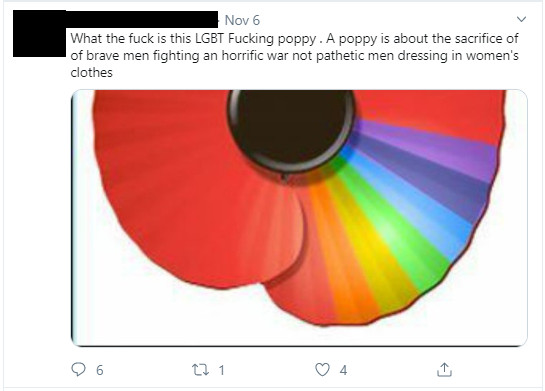
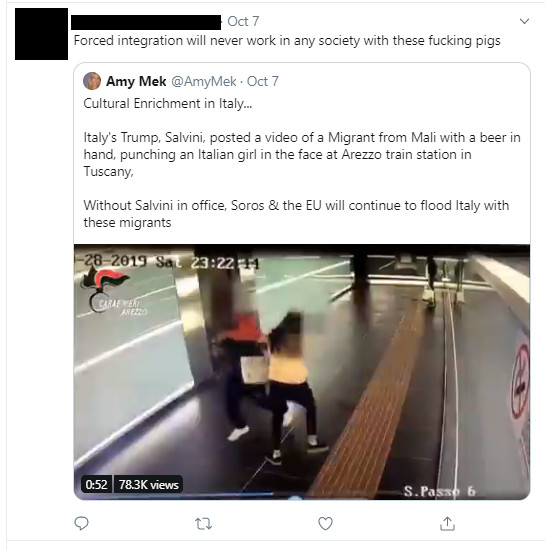
Person Two
This user first attacks William by claiming William is wealthy so can’t suffer racism. He also makes a bizarre argument that William, by speaking about racism he has just experienced, is ignoring racism against white people. He suggests William doesn’t understand what the average person experiences.
Given that William was raised by a single parent (his mother), grew up in a housing estate, and was one of the few African Americans in a predominantly Hispanic area… chances are he has a very solid understanding of racism. A follow up tweet attacks William further for using a photograph with the police officers name and number on it.


This users other Tweets, and indeed their profile description put them firmly on the conservative side of politics. The user attacks academics as all being communists. They attack the UN for not having Australia speak at a climate meeting. They speak about “lefty virtue signallers” in a post about Justin Trudeau and the blackface incidents. In another post they attack multiculturalism saying it isn’t working if it doesn’t allow cultural appropriation. Another post says the ban on climbing Uluru is racist – an inversion of racism which also ignores the fact that Uluru is on private land.

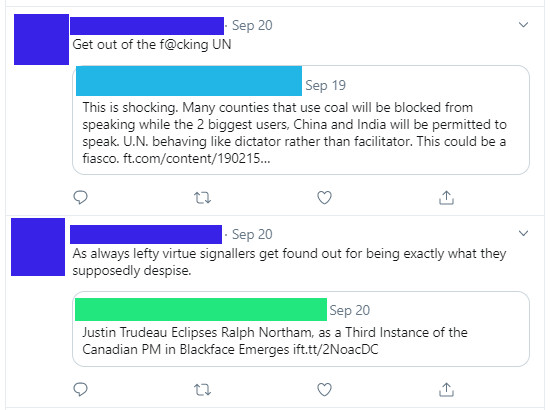


Person Three
The third user we look at takes a similar position to the first, attacking William for calling out racism. Earlier tweets show them rejecting the idea of racism at the US Open and criticising the US and promoting the idea of “most international terrorists” coming from Saudi Arabia.



Disbelief
There were also a range posts that dismissed William’s claims saying the police would not have been called for no reason.
This first one is from someone from the UK who works in the airline industry.

The second from someone in New Zealand.
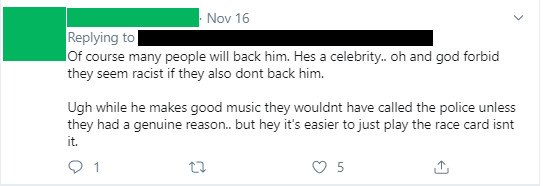
There were a few similar posts from others. The problem with this approach is that it starts with an assumption that the crew had reasonable grounds to act as they did. That is precisely what is at issue. In this case there are a range of witnesses, some of whom gave statements to police, which indicate William behaved reasonable besides missing the initial announcement – something that happens to many passengers on every flight, and without resulting in them being met by police. The fact the police let him go without further action after looking into it supports this claim as well.
The issue exposed here is that some people, usually a small subset of people without personal experience of racism, are highly sceptical of claims of racism and unwilling to entertain the idea that a person may have been really impacted by it.
Witnesses and Support
There were of course also many messages of support, including from people on the flight who confirmed what William had said. He later retweeted these to the entertainment journalist.

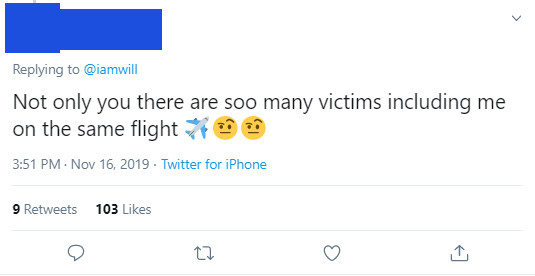
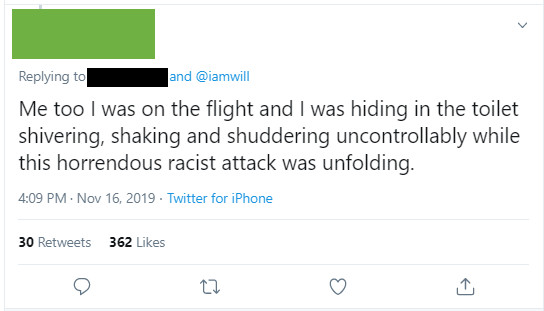
There was also support from others who simply found it highly unlikely William would behave in a way that would justify the police being called.

Publicity as a remedy?
The argument for freedom of speech and an absence of laws against racism, a position often taken by those in the media, is based on the idea that racism will in fact be exposed and that the social consequences of that will be a sufficient deterrent. As US Supreme Court Justice Louis Brandeis wrote in a book of essays in 1914, “Publicity is justly commended as a remedy for social and industrial diseases. Sunlight is said to be the best of disinfectants; electric light the most efficient policeman.” The argument for freedom of speech relies on exposure and consequences.
The argument against exposure relies on there being laws, in this case perhaps terms of employment and internal processes, which are sufficient to prevent racism without the need for public naming and shaming. The greater the level of abuse of power, however, the greater the need for transparency and publicity. Had this incident stopped with the discussion on the plane, and the flight attendant and supervisor providing their name, it would likely have been resolved by William putting in a written complaint to the airlines. Once it was escalated to use the force of the state through the engagement of the police, William opted for a stronger and more public response.
Social media is often used to spread hate, but is can also be used to expose it. Efforts by those in a position of power to avoid public scrutiny increases the reasonableness of a response via social media. In this case there is the alleged refusal to provide staffs names in the one instance, and the alleged demand to stop recording what was happening in the other. In both cases there is the use of the police by airline staff in cases where other passengers have said it was an unnecessary escalation.
Comments & support
Comments on this article can be left on this Facebook thread.
The Online Hate Prevention Institute is an Australian Charity dedicated to tackling all forms of online hate. We are funded through public donations, you can support our work with a tax deductible donation made through the PayPal Giving Fund.
